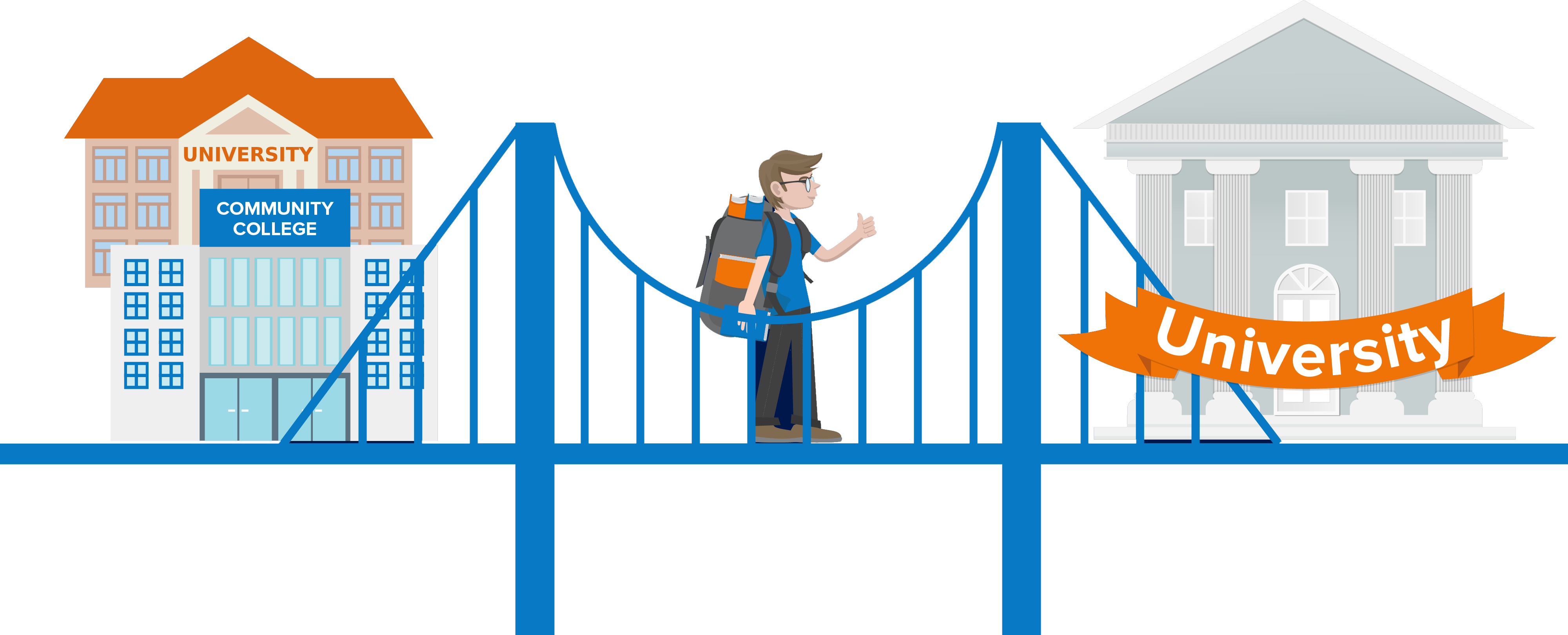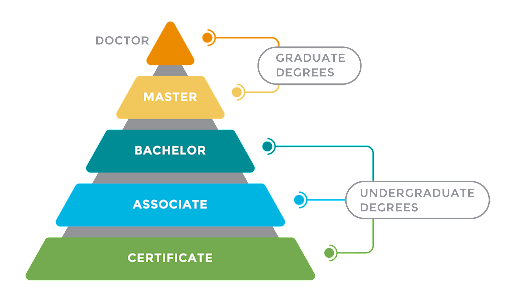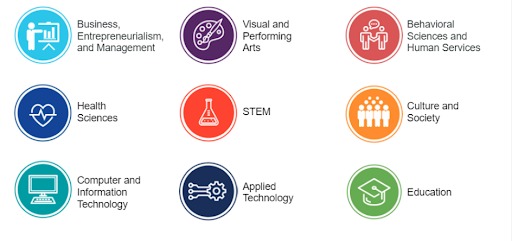19 Higher Education
Navigating Higher Education
You will further explore how your career goals align with your education. It is important to understand the different types of degree and certificate options in higher education, to find which one is the best fit for your goal. We will introduce you to the different levels of degrees and certificates in higher education and which programs are offered at the community college. Additionally, you will review which programs align with transferring to the university and which align with directly entering the workforce. Finally, you will dive into how degree requirements within the different levels align.
The level of education you plan for should be determined by your career of interest. Certain fields have different requirements. Such as IT fields may offend only require certificates or physicians require advanced degrees and doctorates.
Chronology of Higher Education
This is a common arrangement of credentials from the bottom with, undergraduate degrees to the top with terminal degrees or doctoral degrees. However, certificates can also be at the graduate level. Once you earn a bachelor’s degree you may be eligible for a graduate certificate to further your education. Certificates can occur at any point in the educational journey and may also be built into other degrees. Similar to undergraduate certificates, they require fewer credits and time to complete. However, graduate certificates are only offered by institutions offering coursework at the graduate or master level. Look at your career choices and determine what level of education is required for the careers you are most interested in.
Some careers just require a certificate, while others may require an associate’s or higher-level degree. It is always recommended to review your goals and options with an Academic Advisor to provide you with more confidence in your degree choice.
Purpose of Fields of Interest (FOI)
The purpose of the fields of interest (FOI) is to allow you to explore a career path without needing to pick a specific degree just yet. They allow you to look at degrees and certificate options a bit more closely without the pressure. You can build community with other students and instructors within your FOI through events. Additionally, each FOI is assigned an academic advisor to guide you along the way and answer questions about the degrees and certificates available. Get a better understanding of Fields of Interest at Mesa Community College by watching the video below.
Fields of Interest
AGEC: Arizona General Education Curriculum
Most four-year institutions require that, in addition to their main areas of study, students must acquire knowledge in other essential areas. They are often called the “core classes”. MCC’s 35-38 credit General Education program helps students earn core credits before transferring to a college or university. This block of core classes is called the Arizona General Education Curriculum (AGEC) and is built into all transferable Associate degrees. You don’t take additional courses. Completion of the AGEC and at least a 2.5 guarantees admission to Arizona State University, Northern Arizona University, and The University of Arizona. However, some degree programs at the universities have additional admissions requirements.
The areas of study included in the General Education pathways are:
- First Year Composition
- Literacy & Critical Inquiry
- Mathematical Applications
- Computer/Statistics/Quantitative Applications
- Humanities, Arts & Design
- Social-Behavioral Sciences
- Science General/Science Quantitative
- Options (or restricted electives)
- Cultural Diversity in the U.S.
- Global Awareness
- Historical Awareness
There are three AGEC pathways that are degree specific. Remember, the AGEC is already part of any transferable Associate degree. This does not include most Associate of Science (AAS) and Certificate of Completion) CCL programs. You should speak with an advisor to ensure transferability.
AGEC-A
For students who want to study liberal arts when they transfer to the university. Examples: English, History, Religion, Philosophy, Communications
AGEC-B
For students who want to study business when they transfer to the university. Examples: Accounting, Economics, Finance, Marketing
AGEC-S
For students who want to study programs that require more rigorous math and science when they transfer to the university. Examples: Biology, Chemistry, Engineering
Types of Associate Degrees
MCC offers many Associate degrees that prepare you to transfer to a university or enter the world of work directly. Maricopa Community Colleges also offers several bachelor’s degrees to allow you to complete your undergraduate education with us! Two of these bachelor’s degrees, the Bachelor of Applied Science (BAS), Data Analytics and Programming, and the Bachelor of Arts (BA), Early Childhood Education – Dual Language can be completed on-campus at MCC. Let’s examine the differences between the more popular degree types. If your degree isn’t covered below, take a look at the expanded list.
Transfer Friendly
Associate of Arts (AA)
This degree is designed for students transferring to a college and/or university majoring in Liberal Arts. Completion of the degree or the (AGEC A- Arizona General Education Curriculum) will exempt students from Arizona public university admissions requirements for Arizona residents who have a minimum GPA of 2.0 on a 4.0 scale and a minimum of 2.5 on a 4.0 scale for non-residents. Completion of the AGEC A transfers as a block without loss of credit. All courses within the AGEC A must transfer to all three Arizona state universities. Any 100-200 level course, with a grade of C or better, can be applied to the elective credits. Emphasis Areas Available – Ex. Psychology, English, Criminal Justice, Fine Arts, Elementary Education
Associate in Science (AS)
This degree is designed for students transferring to a college and/or university majoring in studies that require more stringent math and science. Completion of the AS transfers as a block without loss of credit. All courses within the AS must transfer to all three Arizona state universities. Emphasis Areas Available – Ex. Engineering, Biological Sciences, Chemistry
Associate in Business, General Requirements (ABUS-GR)
This degree is designed for all Business majors, with the exception of Computer Information Systems majors who should follow the ABUS-SR pathway, who wish to transfer to a university or college. The degree requires 62-63 semester credits for completion. In most cases, completion of the ABUS-GR transfers as a block without loss of credit. All courses within the ABUS-GR must transfer to all three Arizona state universities. Emphasis Areas Available – Ex. Business
Not Transfer-friendly
Associate in General Studies (AGS)
This degree is designed for students whose educational goals require flexibility. The AGS allows students to choose any elective course 100 or above to complete the degree. This degree may be less desirable for students planning to attend four-year college or university.
Associate of Applied Science (AAS)
This degree is recommended for students who desire to gain a depth of technical expertise by completing an occupational program. Students who successfully complete the AAS degree at an Arizona public community college are eligible for admission to any Arizona public university offering the Bachelor of Science (BAS) degree.
Types of Bachelor’s Degrees
Bachelor’s degrees are usually 120 credits in total to complete. You’ll likely transfer 60-64 credits from your completed Associate degree from the community college. We work to align your desired bachelor’s degree at the university with your MCC degree with us before you transfer.
Bachelor of Arts (BA)
A BA degree is designed for students who are interested in following a program in the liberal arts. Common majors include Education, Psychology, Sociology
Bachelor of Science (BS)
A BS degree is one of the most common undergraduate degrees in the US and (just like the name) focuses on science-related courses. Common majors include Biology, Chemistry, Computer Science, Nursing
Bachelor of Applied Science (BAS)
B.A.S. degrees are considered career training degrees and are specifically designed to build on associate degrees that provide workplace skills, known as career training or non-transfer associate degrees (A.A.S.). Certain degrees and programs may have specific university admissions requirements. Common majors include International Business, Marketing, Accounting
Graduate Degrees
Master’s Degree
- 30-60 credits after a bachelor’s degree
- Demonstrates a high level of expertise in a field
- Examples: Master of Art, Master of Science
Professional Degrees
- Prepares students for a particular field or industry, often including licensure or accreditation
- Does not require a Master’s degree
- Example: Medical (Dentistry, Medicine, Audiology), Law
Doctoral Degrees
- Academic Degree
- Often a requirement to teach and perform research at a university
- Requires 3-6 additional years of study depending on the research project
- Examples: Ed.D, Ph.D.
Summary
We design your degree here to fit future goals or direction. If you know your goals, we can work backward to find your courses and build your schedule. Figure out what the overall level of education needed for your career is and fit your time at MCC into the big-picture goal. If you don’t know, now is the time to explore different degrees and careers. This process is important and your plans will likely change, but that is OK.




